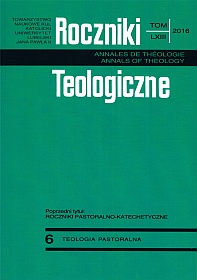High-minded, though somewhat gullible optimism Gaudium et Spes on culture
Abstract
The author comments upon a fragment of the pastoral constitution Gaudium et Spes concerning culture. This concerns the second chapter of the second part entitled “The Proper Development of Culture”. The commentary is written 50 years after the document was embraced by the Second Vatican Council, yet it is not intended as a jubilee commemoration. It looks at the conciliar work while taking into account what has been going on in culture over the past half century. The author highlights the unusual optimism of the conciliar fathers. He refers culture to the perfection of the human person, to the good of the community and to all of human society. They see in it a tool to perfect human talents and the way of his being with others. They state that the number of men and women aware of the fact that they create the culture of their communities is growing. The conciliar fathers seem to sing a praise hymn to culture. However, the mainstream cultural model of our times is a mass culture, that is, culture addressed to the utmost maximum number of recipients. It adjusts to their level, therefore, it resigns from the ambitions of high culture. Mass culture, due to the mediums it uses, has become media-culture. It is an over-technical culture, a culture which is for sale. It remains in the hands of those who hold power or money. The older culture, so-called “folk-culture”, was distinctively mobilizing. It was characterized by the identity of an artist and a recipient. A mass-media culture is by definition demobilizing. A consumer does not need to make any effort. He buys a product and satisfies himself with it. This type of culture does not help the individual person to grow; on the contrary, it makes him lazy. The conciliar fathers predicted that it would be different. But let us not complain about the authors of the document, rather, we should look at ourselves because we have not taken up the task properly. We, that is the creators and consumers of culture.
References
Barbarzyńcy w kulturze. Rozmowa z Anną Chodakowską, „Nasz Dziennik”, 2012, nr 155, s. 11.
Bujak A., Przeciw wygaszaniu Krzyża, w: L. Sosnowski (red.), Wygaszanie Polski 1989-2015, Kraków: Biały Kruk 2015, s. 21-28.
Golinowska S. (red.), Komercjalizacja w kulturze. Szanse i zagrożenia, Warszawa: Instytut Kultury 1992.
Hałaś M., Czas odzyskać kulturę!, „Warszawska Gazeta”, 28 sierpnia-3 września 2015, s. 17.
Inteligencka misja zamiast pogardy dla słabszych. Wywiad z posłem PiS, byłym wiceministrem kultury Jarosławem Sellinem, „Gazeta Polska”, 2015, nr 40, s. 14.
Jan Paweł II, Istnieje – trzeba to stwierdzić bez lęku – chrześcijańska koncepcja kultury, „L’Osservatore Romano” (wyd. pol.), 1984, nr 1-2, s. 20-21. Przedruk: Jan Paweł II, Wiara i kultura. Dokumenty, przemówienia, homilie, wybór tekstów i opracowanie redakcyjne M. Radwan, S. Wyleżek, T. Gorzkula, Rzym–Lublin: RW KUL 1988, s. 233-236.
Jan Paweł II, Przemówienie w siedzibie UNESCO, Paryż, 2 czerwca 1980, w: Przemówienia i homilie Ojca Świętego Jana Pawła II, Kraków: Wydawnictwo „Znak” 1997, s. 267-286.
Jan Paweł II, Kultura ‘królewską drogą’ wyzwolenia z różnych form zniewolenia. Przemówienie do przedstawicieli świata kultury, Florencja, 18 października 1986, w: tenże, Wiara i kultura. Dokumenty, przemówienia, homilie, wybór tekstów i opracowanie redakcyjne M. Radwan, S. Wyleżek, T. Gorzkula, Rzym–Lublin: RW KUL 1988, s. 365-375.
Kawecki W., Kościół i kultura w dialogu (od Leona XIII do Jana Pawła II), Kraków: Wydawnictwo „Homo Dei” 2008.
Kawecki W., Kultura konsumpcyjna i wychowanie do kultury wysokiej, „Studia Theologica Varsaviensia”, 2010, nr 2, s. 177-197.
Kłoskowska A., Socjologia kultury, Warszawa: PWN 1981.
Kroeber A., Istota kultury, Warszawa: Wydawnictwo Naukowe PWN 2002.
Legutko P., Nadchodzą barbarzyńcy, „Rzeczpospolita”, 2010, nr 213, dodatek „Plus Minus” s. P2-P3.
Malinowski B., Szkice z teorii kultury, Warszawa: Książka i Wiedza 1958.
Maritain J., Religia i kultura, Poznań: Naczelny Instytut Akcji Katolickiej 1937.
Mathews G., Supermarket kultury. Kultura globalna a tożsamość jednostki, Warszawa: Państwowy Instytut Wydawniczy 2005.
Orzeszyna J., Kościół wobec globalizacji, Kraków: Wydawnictwo Naukowe PAT 2003.
Pasierb J.St., Pionowy wymiar kultury, Kraków: Wydawnictwo „Znak” 1983.
Poupard P., Pomiędzy barbarzyństwem i nadzieją. Kryzys współczesnej kultury i chrześcijańska odpowiedź, w: R. Rubinkiewicz, S. Zięba (red.), Sacrum i kultura: chrześcijańskie korzenie przyszłości: materiały Kongresu Kultury Chrześcijańskiej, Lublin, 15-17 września 2000 r., Lublin: TN KUL, s. 17-33.
Wilkanowicz S., Kryzys człowieka po totalizmie, w: R. Rubinkiewicz, S. Zięba (red.), Sacrum i kultura: chrześcijańskie korzenie przyszłości: materiały Kongresu Kultury Chrześcijańskiej, Lublin, 15-17 września 2000 r., Lublin: TN KUL 2000, s. 213-218.
Wojtyła K., Chrześcijanin a kultura, w: tenże, Aby Chrystus się nami posługiwał, Kraków: Wydawnictwo „Znak” 1979, s. 457-461.
Copyright (c) 2016 Roczniki Teologiczne

This work is licensed under a Creative Commons Attribution-NonCommercial-NoDerivatives 4.0 International License.





